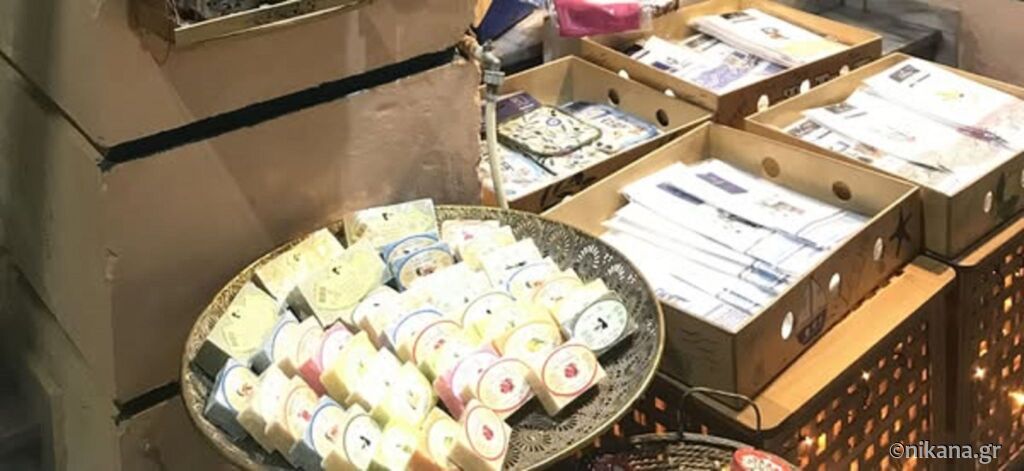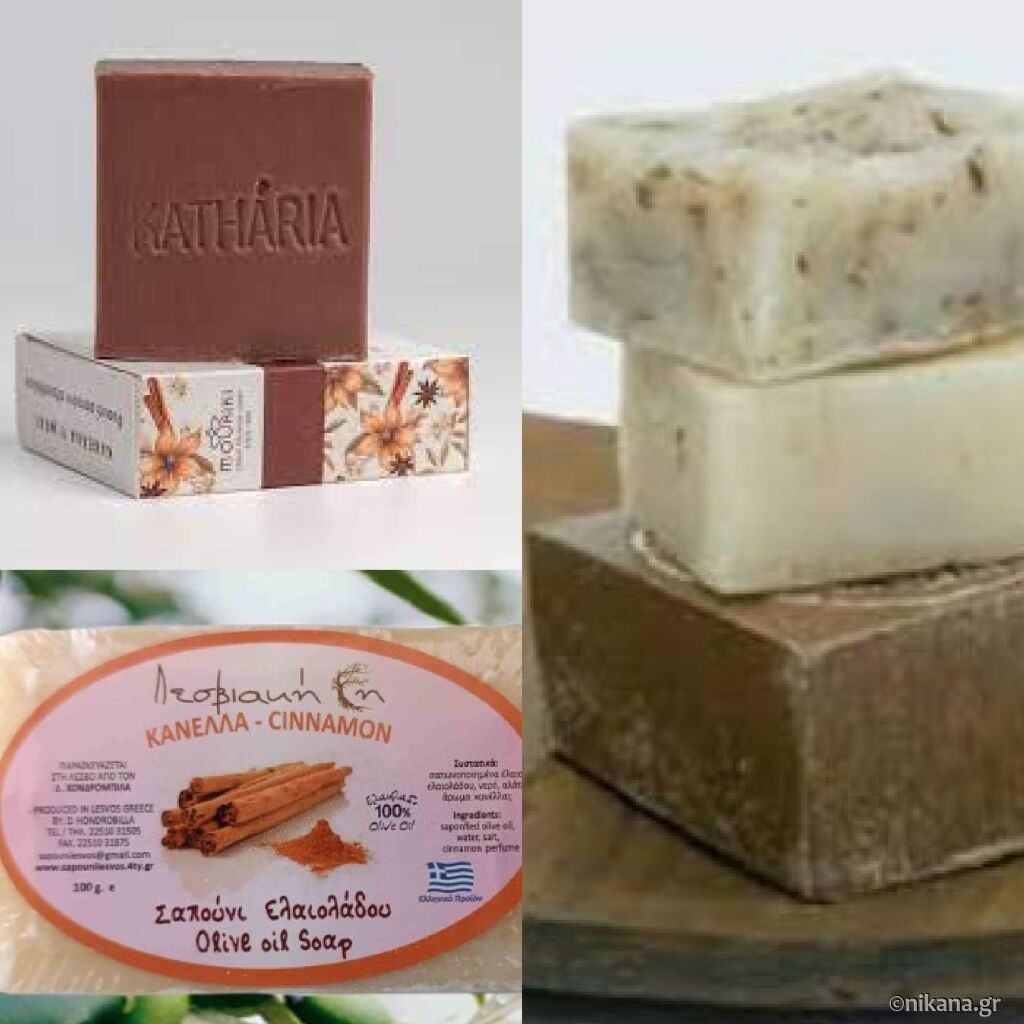More Than a Souvenir: Discover Why Greek Olive Oil Soaps Are a True Gift of the Mediterranean
Vacationing in Greece remains memorable not only for its beautiful beaches and rich history, but also for the authentic products that preserve the tradition and nature of this country. Among them, olive oil soaps occupy a special place - they are not just ordinary souvenirs, but a combination of the skills of old masters, skin care, and scents reminiscent of Mediterranean olive groves and fragrant herbs.
Greek olive oil soaps are a blend of nature, tradition, and health - a true gift of the Mediterranean.
Find out below what makes these soaps so special and why it is worth taking them home.
Greek Olive Oil Soap - More Than a Souvenir
In an era of industrial products and fast-paced living, Greek family workshops still produce soap in the traditional way it has been made for centuries. Genuine homemade olive oil soap is not just soap - it is part of local culture, part of everyday life, but also a precious natural product that enchants with its scents and simplicity.
Why is ordinary homemade soap more than a souvenir?
The main ingredient is olive oil - the heart of Mediterranean soap. It is a natural ingredient with multiple benefits. Olive oil has strong regenerative, antibacterial, and moisturizing properties. In Greek tradition, it is used not only in cooking but also in cosmetics, balms, and soaps. Real olive oil soap:
- Does not dry out the skin
- Does not contain artificial additives
- Is completely biodegradable
Why? Because olive oil is:
- Rich in antioxidants and vitamin E, olive oil protects and nourishes the skin, preventing dryness.
- Acts as a natural antibacterial and anti-inflammatory agent.
- Environmentally friendly because the soaps do not contain harmful chemicals and are biodegradable.
- Olive oil is not only food and medicine for the skin but also a symbol of Mediterranean culture and health.
That is why homemade soaps are popular among tourists looking for natural products and authentic gifts.
How is traditional Greek soap made?
A process that takes time - and is worth it!
In many parts of Greece, such as Lesbos, Crete, the Peloponnese, and Corfu, the traditional soap-making process is still preserved, using olive oil, through a cold process. This means that the olive oil is not heated to high temperatures, but the saponification process occurs slowly and naturally. This way, the healing properties of the oil are preserved. Many soaps also contain additives:
- Lavender, rosemary, or lemon peel
- Honey, St. John’s Wort, or cinnamon
- Sea salt or clay
Where to buy real homemade soap in Greece?
Most of them are hand-cut, simply packaged, and without aggressive scents - just what a true traveler seeks. You can find real olive oil soap:
- In small family workshops and markets.
- In olive oil museums.
- In local cosmetic shops that emphasize traditional production.
- In souvenir shops.
Avoid buying soap in large supermarkets where industrial products with synthetic additives are sold.
What sets them apart from commercial soaps?
Many soaps sold in supermarkets are not actually soaps - but detergents with added scents and lather. Real olive oil soap:
- Does not contain artificial colors
- Does not contain sulfates or parabens
- Is suitable for people with sensitive skin
By using homemade soap, not only is the skin protected, but small producers and the local economy are also supported.
You can easily recognize them, as they are mostly hand-cut, have a mild scent. The colors vary depending on the plants added to them, but we are sure you have seen slightly green and slightly purple (lilac) soaps at markets and small shops in Greece. The green color comes from olive pits, and the slightly purple ones are soaps with lavender oil.
The Roots of Soap Production - the Centuries-old Connection Between Greece and the Levant
We use soap every day, but we rarely think about its origin. Without soap, the world would look very different - not just aesthetically, but also in terms of health. Its role in preventing diseases from dirty hands (such as jaundice, scabies, or intestinal parasites) remains invaluable.
The Origin of Soap: From the Middle East to the Aegean
The emergence of soap in human society is linked to sacrificial rituals, specifically with altars where rituals were performed, although without precise evidence. According to one version, a mixture of burnt fat, ash, and water at sacrificial sites created a liquid mixture that people discovered as a cleansing agent. Regardless of the exact origin, it is clear that the region of the Middle East, including the Aegean basin, is the cradle of early forms of saponification.
The first traces of substances similar to soap use appear in Mesopotamia around 2800 BCE. Egyptian papyri record the mixing of plant fats and alkalis, while in ancient Greece, advanced hygiene practices existed, although soap in its present form was not yet known.
In short, the birthplace of soap is linked to the present-day Middle East region. And we know that this part is inextricably linked to the development of Greek civilization. Hence the question in Greek circles: did soap originate in Babylon or Lesbos? We do not intend to enter into that debate, nor do we have the knowledge, we just state the fact that this region and time frame are associated with the origin of soap, a product for which we owe the current number of the human population.
Do you know when soap started being made in Greece?
We were surprised ourselves at how long the tradition of making and using soap in Greece has been.
The first soaps in Greece were made back in the Archaic period (8th, 7th, and 6th centuries BCE) on the island of Lesbos, using olive oil and ash. In the Middle Ages, Middle Eastern influences further advanced soap production, making it finer and more diverse.
The soap-making process used today in traditional workshops maintains authenticity and quality.
Olive oil is heated at low temperatures, preserving its properties.
Soap and Hygiene Practices in Ancient Greece
Textual sources from antiquity
Homer (8th century BCE) in the “Iliad” describes bathing rituals that involve the use of oil and a strigil (metal scraper) to remove dirt and sweat after washing. Although soap as such is not mentioned, these descriptions indicate developed hygiene habits:
“They bathe and rub themselves with oil, and then clean their skin with a strigil.” (Iliad, translation)
Olive oil would be applied in a thick layer on the skin, let sit for a while, and then scraped off with a special tool - a scraper. It was believed that the oil would remove all dirt. We have also heard about this practice from the local population.
Hippocrates (5th-4th century BCE), the father of medicine, mentions the use of alkaline substances and plant extracts for treating skin diseases and cleaning wounds, which can be interpreted as the use of soap-like materials:
”…for washing and caring for the skin, we use solutions of ash and plant juices...” (from hygiene manuscripts)
Galen (2nd century CE), although a later author, conveys knowledge about soap based on Greek tradition:
“We make soap by mixing olive oil and alkalies obtained from ash.” (De Compositione Medicamentorum)
Archaeological and material evidence
At archaeological sites on the island of Lesbos and its surroundings, remains of oil and ash in ceramic vessels have been found, indicating mixtures used for skin cleaning or care (Porifera, 2018).
The lack of preserved soaps is due to their natural biodegradability, but the presence of alkaline substances in prehistoric sacrificial altars (ash analyses) suggests a practice that preceded true soap.
What tradition and mythology say about soap
Local customs on Lesbos connect the origin of soap with the poet Sappho, from whose name (sapo) the term “soap” is allegedly derived. Although there is no solid historical evidence, this connection symbolizes the ancient origin of the practice in that area.
Greek folk customs and oral tradition confirm the use of olive oil and ash for washing from ancient times to the present day (KnossosSoap.gr, 2023).
Works such as “The Origins of Soap in Ancient Greece” (Journal of Mediterranean Archaeology, 2020) highlight that the saponification process was known in the form of primitive soaps in the Aegean basin, with olive oil as a key ingredient.
Lesbos - the Forgotten Birthplace of Soap?
Lesbos is one of the oldest centers of soap making in Greece. The first soaps were made from olive oil and ash, using a simple cooking and mixing process. Some local myths even connect soap with the poetess Sappho, claiming that the word “soap” is derived from her name (“sapo”). Although this claim lacks scientific basis, it reflects the importance of the island in the development of the craft.
Archaeological finds on Lesbos testify to ceramic vessels containing traces of oil and ash, interpreted as early mixtures for skin cleaning and care (Porifera, 2018).
Soap making tradition - from the Middle Ages to the 20th century
During the Byzantine and Ottoman rule, soap continued to be present in households, especially on islands with developed olive cultivation. A great flourishing of soap making occurred from the mid-19th to the mid-20th century.
In 1919, Lesbos produced 54% of the Greek soap exports and had even half of all major steam soap factories. Names like Papucanis (founded in 1870) are still present in Greece today. From the Alepudelis family, originating from Lesbos, also came the father of Nobel laureate Odysseas Elytis, the owner of a famous soap factory that operated in Piraeus.
Soap today: a return to tradition.
In small Greek workshops, soap is still handmade today, using methods similar to those from ancient times. Olive oil is heated at low temperatures, natural alkalines are added, and fragrant ingredients like lavender, rosemary, honey, or salt enrich the product.
This tradition not only preserves the craft but also the connection between generations, as well as a specific, local identity and hygiene culture.
The Greek soap-making tradition, rooted in ancient hygiene, has survived centuries, wars, and industrial changes. Today, as we turn back to natural and sustainable products, it is worth remembering that homemade soap from Greece is not just a cleansing agent - but also part of the cultural identity of a people.
Questions for you, travelers and lovers of Greece
Do you buy homemade soaps in Greece?
What is your favorite scent?
Do you like soaps with added essential oils?
Have you noticed interesting shapes or packaging?
Write to us in the comments and share your experience with handmade soaps from Greece.
By purchasing real homemade soap, you support sustainable tourism and preserve part of Greek culture and craftsmanship. Let this “little gift of the Mediterranean” become a dear memory for you.
We are always here to help you explore Greece! Follow us for the latest information, useful tips and authentic experiences to spend an unforgettable vacation in Greece!
We offer over 3,000 accommodations. Choose the right one for you and your family HERE.
Follow us on social networks where we regularly share exclusive offers, discounts and special arrangements for vacations in Greece as well as information, advice and useful news.
Facebook:Nikana.gr
Instagram: @nikana.gr
Tiktok: nikana.gr
Facebook grupa: Live from Greece
YouTube kanal @NikanaTravel
Write to us at e-mail: nikana@nikana.gr
Our site nikana.gr is the leading source of information about Greece.









Post a Comment
NOTE
All your questions in the comments will receive an answer via email so check your inbox shortly after you posted comment. For more detailed questions and responses, contact us via mail nikana@nikana.gr.